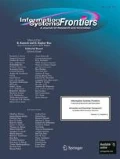Abstract
Scheduling resources in grid is an open difficult problem due to resource fluctuations. A fuzzy scheduling method using provenance information is proposed. In this method, resource dispatch probability is dynamically adjusted according to user feedback information, which is user appreciation information represented by fuzzy variables. To minimize the influence of cheating, collusive and decrying of user appreciations, provenance information is used to estimate trust factor of each user appreciation during resource dispatch probability adjustment process. Simulation results confirm capability of the proposed method to effectively reduce impacts of malicious user appreciations and increase user satisfactions.










Similar content being viewed by others
References
Braun, T. D., Siegel, H. J., Beck, N., et al. (2001). A comparison of eleven static heuristics for mapping a class of independent tasks onto heterogeneous distributed computing systems. Journal of Parallel and Distributed Computing, 61(6), 810–837.
Buneman, P., Khanna, S., & Tan, W. C. (2001). Why and where: a characterization of data provenance. Lecture Notes in Computer Science, 1973, 316–330.
Cao, J., & Zimmermann, F. (2004). Queue scheduling and advance reservations with COSY. In Proceedings of 18th International Parallel and Distributed Processing Symposium (IPDPS 2004).
Fernandez-Baca, D. (1989). Allocating modules to processors in a distributed system. IEEE Transactions on Software Engineering, 15(11), 1427–1436.
Foster, I. T., Vöckler, J. S., Wilde, M., Zhao, Y. (2002). Chimera: A virtual data system for representing, querying, and automating data derivation, SSDBM, 37–46.
Maheswaran, M., Ali, S., Siegel, H. J., et al. (1999). Dynamic matching and scheduling of a class of independent tasks onto heterogeneous computing systems. Proceedings of the 8th IEEE Heterogeneous Computing Workshop (HCW99). IEEE Computer Society Press, 30–44.
Mekouar, L., Iraqi, Y., & Boutaba, R. (2006). Peer-to-peer’s most wanted: malicious peers. Computer Networks, 50(4), 545–562.
Miles, S., Groth, P., Branco, M., Moreau, L. (2005). The requirements of recording and using provenance in e-Science experiments, Technical Report. Electronics and Computer Science, University of Southampton.
Smith, W., Foster, I., Taylor, V. (2000). Scheduling with advanced reservations. In Proc. of the Int. Parallel and Distributed Processing Symposium (IPDPS), 127–132.
Spooner, D. P., Jarvis, S. A., Cao, J., et al. (2003). Local grid scheduling techniques using performance prediction. IEE Proceedings of Computers and Digital Techniques, 150(2), 87–96.
Stevens, R. D., Robinson, A. J., & Goble, C. A. (2003). myGrid: personalised bioinformatics on the information grid. Bioinformatics, 19, 302–304.
Wang, Y., & Wu, C. (2005). Study on equipment interoperation chain model in grid environment. Lecture Notes in Computer Science, 3758, 588–595.
Yang, L., Schopf, J. M., Foster, I. (2003). Conservative scheduling: Using predicted variance to improve scheduling decisions in dynamic environments. Supercomputing 2003, Phoenix, November 2003.
Yin, J., Cao, J., Wang, Y. X., et al. (2007). Scheduling remote access to scientific equipments in cyberinfrastructure for education and research. International Symposium on Cluster Computing and the Grid.
Acknowledgments
This work was supported in part by the National Natural Science Foundation of China Grant 60553001, 60604033, the National Basic Research Program of China Grant 2007CB807900, 2007BC807901 and the Hi-Tech research & Development Program of China Grant 2006AA10Z216.
Author information
Authors and Affiliations
Corresponding author
Rights and permissions
About this article
Cite this article
Wang, Y., Yin, J. A reliable scheduling method in equipment grid using provenance information. Inf Syst Front 15, 589–598 (2013). https://doi.org/10.1007/s10796-013-9437-6
Published:
Issue Date:
DOI: https://doi.org/10.1007/s10796-013-9437-6




